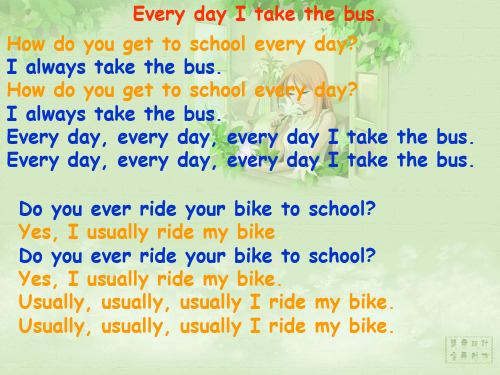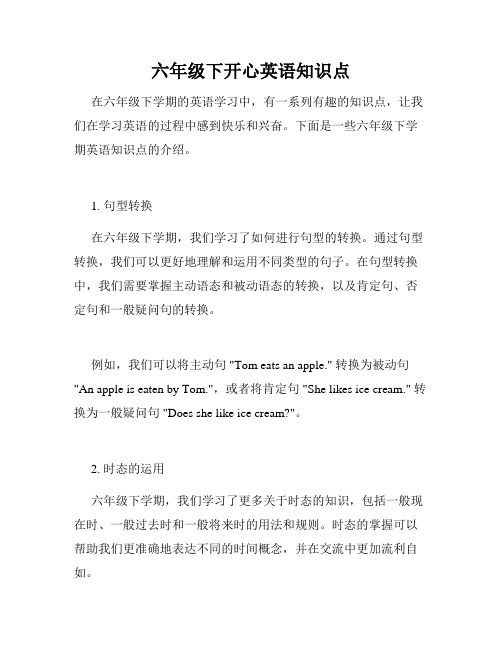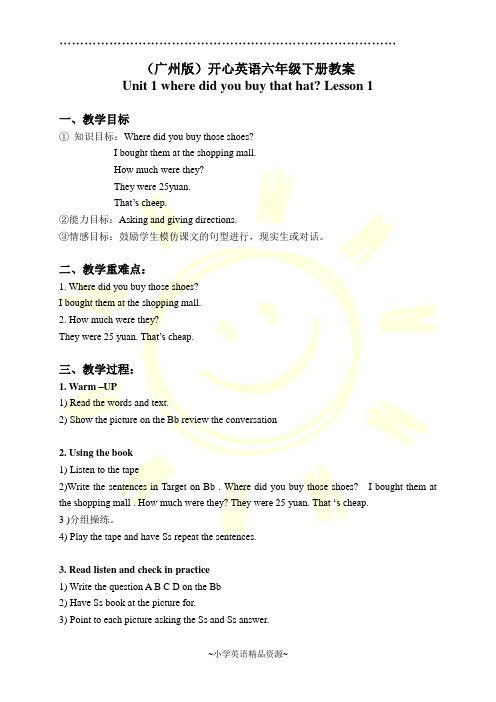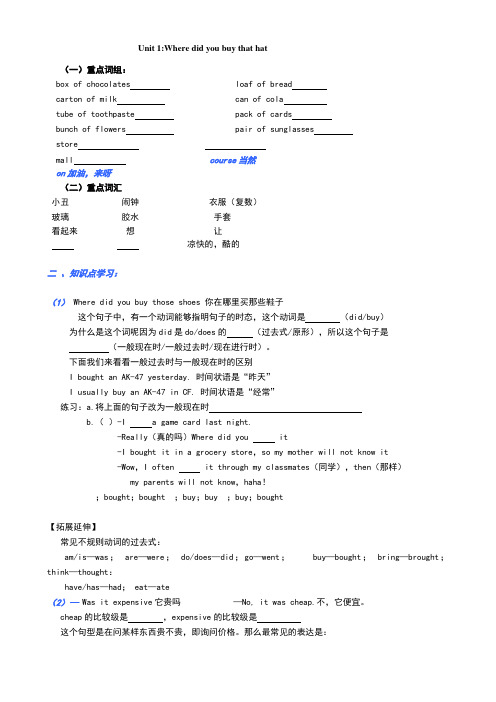广东版开心英语六年级下册知识点
广东粤人开心版六年级下册英语 Unit 2 Story课件

单元新词
anything
任何事物;任何东西 巧记 any + thing = anything 短语 anything else 别的什么东西 例句 Is there anything interesting?
有什么有趣的东西吗?
第七页,共二十八页。
单元新词
bottle
瓶子 短语 a bottle of... 一瓶……
广东粤人开心版目:英语 适用版本:广东粤人开心版 适用范围:【教师教学】
Unit 2 A Magic Day
………………S…to…r…y…………
第一页,共二十八页。
单元新知
第二页,共二十八页。
单元新词
beautiful
美丽的
联想 beauty (名词)美丽 反义词:ugly(形容词)丑陋的
例句 Mary has a beautiful dress. 玛丽有一条漂亮的裙子。
第三页,共二十八页。
单元新词
desert
沙漠
短语 the Sahara Desert 撒哈拉大沙漠
例句 It’s hard to find water in a desert.
在沙漠中很难找到水。
第四页,共二十八页。
第二十五页,共二十八页。
一、根据图片提示,补全Story。 Oh, a __b_o_t_tl_e_ of water! I want it!
4
第二十六页,共二十八页。
一、根据图片提示,补全Story。
5
That’s not water! That’s a _m__a_g_ic_ lamp!
第二十七页,共二十八页。
一、根据图片提示,补全Story。
广东版开心英语六年级下册Unit10之三

She is going to get to Hainan.
6. What is she going to do in Hainan? She is going to go camping.
Do you ever drive your car to work? Yes, I always drive my car. Do you ever drive your car to work? Yes, I always drive my car. Every day, every day, every day I drive my car. Every day, every day, every day I drive my car.
How are you going to get to Hainan? Where are you going to stay? What are you going to do?
Listen to the dialogue and answer these questions : 1. Did Kate get to Beijing in last summer holiday?
Vocabulary:
by ship by plane by bus by train
stay in a hotel go camping go sightseeing stay with relatives
How are you going to get to Hong Kong?
by ship.
Every day I take the bus.
广东版开心英语六年级下册unit1知识点(可编辑修改word版)

Unit 1:Where did you buy that hat?(一)重点词组:1.a box of chocolates2.a loaf of bread3.a carton of milk4.a can of cola5.a tube of toothpaste6.a pack of cards7.a bunch of flowers 8.a pair of sunglasses9.grocery store 10.supermarket11.shopping mall 12.of course 当然e on 加油,来呀(二)重点词汇1.cl own 小丑2.cl ock 闹钟3.cl othes 衣服(复数)4.gl ass 玻璃5.gl ue 胶水6.gl ove 手套7.look 看起来8.think 想9.let 让10.cheap 11.expensive 12.cool 凉快的,酷的二、知识点学习:(1)Where did you buy those shoes?你在哪里买那些鞋子?这个句子中,有一个动词能够指明句子的时态,这个动词是(did/buy)为什么是这个词呢?因为did 是do/does 的(过去式/原形),所以这个句子是(一般现在时/一般过去时/现在进行时)。
下面我们来看看一般过去时与一般现在时的区别I bought an AK-47 yesterday. 时间状语是“昨天”I usually buy an AK-47 in CF. 时间状语是“经常”练习:a.将上面的句子改为一般现在时b.()-I a game card last night.-Really(真的吗)?Where did you it-I bought it in a grocery store,so my mother will not know it-Wow,I often it through my classmates(同学),then(那样)my parents will not know,haha!A.bought;bought;boughtB.bought;buy;buyC.buy;buy;bought【拓展延伸】常见不规则动词的过去式:am/is—was;are—were;do/does—did;go—went;buy—bought;bring—brought;think—thought:have/has—had;eat—ate(2)—Was it expensive?它贵吗?—No, it was cheap.不,它便宜。
六年级下开心英语知识点

六年级下开心英语知识点在六年级下学期的英语学习中,有一系列有趣的知识点,让我们在学习英语的过程中感到快乐和兴奋。
下面是一些六年级下学期英语知识点的介绍。
1. 句型转换在六年级下学期,我们学习了如何进行句型的转换。
通过句型转换,我们可以更好地理解和运用不同类型的句子。
在句型转换中,我们需要掌握主动语态和被动语态的转换,以及肯定句、否定句和一般疑问句的转换。
例如,我们可以将主动句 "Tom eats an apple." 转换为被动句"An apple is eaten by Tom.",或者将肯定句 "She likes ice cream." 转换为一般疑问句 "Does she like ice cream?"。
2. 时态的运用六年级下学期,我们学习了更多关于时态的知识,包括一般现在时、一般过去时和一般将来时的用法和规则。
时态的掌握可以帮助我们更准确地表达不同的时间概念,并在交流中更加流利自如。
举例来说,我们可以用一般现在时描述日常的习惯和经常发生的动作,如 "I often go to the park on weekends.";用一般过去时表达过去发生的动作或事件,如 "She watched a movie last night.";用一般将来时表示将来要发生的动作,如 "We will have a party next Sunday."。
3. 阅读理解在六年级下学期,我们开始进行更深入的阅读理解训练。
通过阅读不同类型的文章,包括短文、对话和故事,我们可以提高阅读理解和语言理解的能力。
在阅读理解中,我们需要仔细阅读文章内容,理解关键信息,并回答相关的问题。
阅读理解的练习可以帮助我们提高阅读速度和理解能力,并扩大我们的词汇量。
同时,通过阅读理解活动,我们还可以了解不同的文化背景和常识知识。
六年级开心版英语知识点

六年级开心版英语知识点一、名词(Nouns)名词是用来表示人、动物、事物、地方、时间等具体或抽象概念的词语。
在英语中,名词通常用来作主语、宾语等。
1. 可数名词(Countable Nouns)可数名词可以用来表示一个或多个个体的名词,可以用数字进行计数。
例如:dog(狗)、apple(苹果)、book(书)等。
2. 不可数名词(Uncountable Nouns)不可数名词用来表示无法进行数的名词,无法用数字进行计数。
例如:milk(牛奶)、water(水)、rice(米饭)等。
二、动词(Verbs)动词是用来表示行为、动作、状态或存在的词语。
在英语中,动词根据不同的时态和语态来表达不同的意思。
1. 现在时态(Present Tense)现在时态用来表示现在正在进行或经常性发生的动作或状态。
常见的现在时态动词有:play(玩)、study(学习)、like(喜欢)等。
2. 过去时态(Past Tense)过去时态用来表示过去发生的动作或状态。
在一般情况下,过去时态动词要在词尾加上-ed。
例如:played(玩过)、studied(学习过)、liked(喜欢过)等。
3. 将来时态(Future Tense)将来时态用来表示将来将要发生的动作或状态。
常见的将来时态动词有:will go(将要去)、shall study(将要学习)、am/is/are going to play(将要玩)等。
三、形容词(Adjectives)形容词用来描述或修饰名词,表示名词的性质、特征或状态。
形容词一般位于名词之前。
1. 基本形容词(Basic Adjectives)基本形容词表示普通或基本性质的形容词。
例如:big(大)、small(小)、happy(快乐)等。
2. 比较级形容词(Comparative Adjectives)比较级形容词用来比较两个事物的大小、程度或质量等。
一般在形容词后面加上-er,或在形容词前面加上more。
广东开心英语六年级下册教案 Unit 1(1) 第二课时

(广州版)开心英语六年级下册教案Unit 1 where did you buy that hat? Lesson 1一、教学目标①知识目标:Where did you buy those shoes?I bought them at the shopping mall.How much were they?They were 25yuan.That’s cheep.②能力目标:Asking and giving directions.③情感目标:鼓励学生模仿课文的句型进行,现实生或对话。
二、教学重难点:1. Where did you buy those shoes?I bought them at the shopping mall.2. How much were they?They were 25 yuan. That’s cheap.三、教学过程:1. Warm –UP1) Read the words and text.2) Show the picture on the Bb review the conversation2. Using the book1) Listen to the tape2)Write the sentences in Target on Bb . Where did you buy those shoes? I bought them at the shopping mall . How much were they? They were 25 yuan. That ‘s cheap.3 )分组操练。
4) Play the tape and have Ss repeat the sentences.3. Read listen and check in practice1) Write the question A B C D on the Bb2) Have Ss book at the picture for.3) Point to each picture asking the Ss and Ss answer.4 ) Play the tape listen and tick out last cheek it .4. Ask and answer in practice 2.1. )Have Ss ask and answer in practice2.2. )cheek it others5. Song activity1)Have Ss look at the picture around the lyrics. T: Point to the box of chocolates , What’s this . Ss: It’s a box of chocolates2)Do the same with the park of cards3)Ask individual Ss to read the lyrics4)Play the tape and ask Ss to point to each word .(5)play the tape again and have Ss practice singing .6. listen and draw lines .(1): Have Ss look at the pictures.T :(point to the flowers What’s this?Ss: It’s a bunch of flowers.T :How much is this?Ss :It’s 160yuan .T : It’s expensive .Ss : It’s expensive .(2) listen to the tape. Ask Ss to point to the correct pictures.(3) play the tape again and have Ss draw the line to the word.(4) Check the answer together with the class.7. expansion activity Sb. P c.8. Homework .a) Read the Conversation.b) Copy the Review.。
【粤人版,开心英语】六年级下册英语素材-Unit 2 A magic day 知识总结及课文翻译

Unit 2 A magic day 学问总结及课文翻译单词went去(go的去时)ate吃( eat的过去时形式)wrote写( write的过去时形式)read读( read的过去时形式)made做( make的过去时形式)rode骑( ride的过去时形式)--rode a horse 骑马,rode a bike 骑自行车sang唱( sing的过去式形式)drank喝;饮( drink的过去时形式)What a...!多么……-啊!beautiful秀丽的--beauty (名词)秀丽;beautifully(副词)秀丽地反义词:ugly(形容词)丑陋的desert沙漠--the Sahara Desert 撒哈拉大沙漠feel觉得chicken鸡肉--chick (小鸡)+ en = chickenanything任何事物,多用于否定句或疑问句中;--any + thing = anythinganything else 别的什么东西bottle瓶子--a bottle of... 一瓶……two bottles of... 两瓶……不行数名词量的表达方式:数词+量词+of+不行数名词如: a bottle of water 一瓶水,two bottles of water两瓶水lamp灯--近义词:light (名词)灯Unit 2 Story故事翻译In a desert...在沙漠里……Wow! What a beautiful desert!哇!多么秀丽的沙漠啊!I feel hungry. Let's have lunch.我觉得很饿。
让我们吃午餐吧。
What did you eat this morning?今日早上你吃什么了?I ate cheese, chocolate, chicken, and ice cream.我吃了奶酪、巧克力、鸡肉和冰淇淋。
Did you drink anything this morning?今日早上你喝东西了吗?No, I didn' t. I' m thirsty now.不,我没喝。
广东版开心英语六年级下册知识点

Unit 1:Where did you buy that hat(一)重点词组:box of chocolates loaf of breadcarton of milk can of colatube of toothpaste pack of cardsbunch of flowers pair of sunglassesstoremall course当然on加油,来呀(二)重点词汇小丑闹钟衣服(复数)玻璃胶水手套看起来想让凉快的,酷的二、知识点学习:(1) Where did you buy those shoes 你在哪里买那些鞋子这个句子中,有一个动词能够指明句子的时态,这个动词是(did/buy)为什么是这个词呢因为did是do/does的(过去式/原形),所以这个句子是(一般现在时/一般过去时/现在进行时)。
下面我们来看看一般过去时与一般现在时的区别I bought an AK-47 yesterday. 时间状语是“昨天”I usually buy an AK-47 in CF. 时间状语是“经常”练习:a.将上面的句子改为一般现在时b.()-I a game card last night.-Really(真的吗)Where did you it-I bought it in a grocery store,so my mother will not know it-Wow,I often it through my classmates(同学),then(那样)my parents will not know,haha!;bought;bought ;buy;buy ;buy;bought【拓展延伸】常见不规则动词的过去式:am/is—was;are—were;do/does—did;go—went;buy—bought;bring—brought;think—thought:have/has—had; eat—ate(2)— Was it expensive它贵吗—No, it was cheap.不,它便宜。
- 1、下载文档前请自行甄别文档内容的完整性,平台不提供额外的编辑、内容补充、找答案等附加服务。
- 2、"仅部分预览"的文档,不可在线预览部分如存在完整性等问题,可反馈申请退款(可完整预览的文档不适用该条件!)。
- 3、如文档侵犯您的权益,请联系客服反馈,我们会尽快为您处理(人工客服工作时间:9:00-18:30)。
Unit 1:Where did you buy that hat(一)重点词组:box of chocolates loaf of breadcarton of milk can of colatube of toothpaste pack of cardsbunch of flowers pair of sunglassesstoremall course当然on加油,来呀(二)重点词汇小丑闹钟衣服(复数)玻璃胶水手套看起来想让凉快的,酷的二、知识点学习:(1) Where did you buy those shoes 你在哪里买那些鞋子这个句子中,有一个动词能够指明句子的时态,这个动词是(did/buy)为什么是这个词呢因为did是do/does的(过去式/原形),所以这个句子是(一般现在时/一般过去时/现在进行时)。
下面我们来看看一般过去时与一般现在时的区别I bought an AK-47 yesterday. 时间状语是“昨天”I usually buy an AK-47 in CF. 时间状语是“经常”练习:a.将上面的句子改为一般现在时b.()-I a game card last night.-Really(真的吗)Where did you it-I bought it in a grocery store,so my mother will not know it-Wow,I often it through my classmates(同学),then(那样)my parents will not know,haha!;bought;bought ;buy;buy ;buy;bought【拓展延伸】常见不规则动词的过去式:am/is—was;are—were;do/does—did;go—went;buy—bought;bring—brought;think—thought:have/has—had; eat—ate(2)— Was it expensive它贵吗—No, it was cheap.不,它便宜。
cheap的比较级是,expensive的比较级是这个句型是在问某样东西贵不贵,即询问价格。
那么最常见的表达是:eg. How much is this book改为复数句:How much are these books改为同义句:What is the price(价格) of this book翻译:一盒巧克力多少钱两盒巧克力多少钱【拓展延伸】常见疑问代词的含义及用法总结:I.问“几点钟”:-What time is it now-It’s (七点钟)II.问“……多少钱”—How much is your watch改为同义句:—It (look)nice and It’s two yuan.III.问“数量有多少”对于可数名词——A:—Do you have girlfriends ,kidB:—Of course.翻译:A:—Then,how many girlfriends do you haveB:—A lot.翻译:A:—Wow,unbelievable(难以置信的)!对于不可数名词——Boy:—How much money do you have,old manMan:— Two thousand(千)dollars.翻译Boy:—Wow,Then,(你每天吃多少米饭)Man:—I’m old now,so I only eat a little(一点点),just 15 (bowl) IV.问“什么时候”——When do you usually get up你通常什么时候起床When is your birthday翻译:When you often go to school你通常几点钟上学练习:when he play football他什么时候踢足球V.问“要多久时间”——how longHow long have you lived here你住这里已经多久了VI.问“多久一次”——— How often do you play games—Twice/once a week. 一周两次/一次VII.问“怎样”——-How do you usually go to school -By bike.VIII.问“星期几”——今天星期几IX.问“几月几号”——dateWhat is the date today几天几月几号啊X.问“年龄”——How old is sheXI.问“哪一个”——Which is taller, you (或者)heXII.问“谁”Who are you你是谁Who (teach)you English练习:用特殊疑问词填空.you buy the chocolate At the supermarket.did she get to the cinema At 2:00.did they study English Four years.did he eat hamburgers last year Sometimes.did you go to London By air.didn’t Jenny go to school Because she was ill.bought the sausages Sally did .(3) You look cool!你看起来帅呆了!look“看起来”它的第三人称单数是:过去式是:练习: She (look)a little (肥)after New Year’s Day.【拓展延伸】①look after照顾,照看; look at 看,注视; look up查阅(字典等)must look after my mother at home. She is ill. 我母亲生病了,我必须照顾她。
Look at A side! There are two enemies there!看A点,有两个敌人在那。
You can look up this word “ab normal” in the dictionary. 你可以在词典里查“变态”这个单词②表示“……(看,听,尝,闻,感觉)起来”的动词,我们称之为感官动词,即与人的五官有关的动词,后面往往接一个形容词。
You look(看起来) really beautiful,Gogo!你看上去真漂亮,Gogo!Bullets don’t taste(尝起来) good,man. 老兄,子弹尝起来可不好吃啊。
These flowers smell(闻起来) a little exciting. 这些花闻起来让人有点兴奋.I ate too much on New Year’s Day,I don’t feel(感觉起来) well now.我除夕晚上吃撑了,现在感觉不太好。
③拓展词汇:ugly 丑陋的; handsome英俊的; rich 有钱的; poor穷的;翻译:a.你可以在字典里查阅“英俊”这个单词。
You canb.那个家伙有一部Iphone5,他看上去非常有钱.That guy . He(4)But can you see,Gogo 但是,Gogo 你看得见么but“但是”,and的意思是:,or的意思是:练习:用but,and,or填空I have a book a pen, he has three books and pens.Do you know which has more,I hecan“能,会,可以”属于情态动词,与must,will(将,将要)一样,后面接一个动词原形You must be careful 你必须小心谨慎些。
Of course I can learn English well.我当然可以学好英语。
I will go to Beijing one day.有一天我将要去北京。
运动品牌匹克宣传语:I can play.改为否定句:一般疑问句肯定与否定回答Yes, No,【注意】can还有另外的意思。
本节课中我们还学了“a can of cola”这里面can的意思是“罐,罐装”是一个名词。
(5)Let’s run!Come on,I’m faster than you.让我们赛跑吧.来呀,我比你快哦。
这个句子中Let’s是的缩写,句型:let sb do sth.“让某人做某事”注意sb为人称代词的时候要用宾格练习:()—This box is so heavy. —Let you.;to help ;help ;helpcome on意为“来呀,加油”用于鼓励别人,或者表示催促,当然,也不排除挑衅如:Come on,come on!Catch me,catch me!来呀,来呀,有本事来抓我呀!哈哈哈!【拓展延伸】let’s 与let us 有细微的区别,let’s表示说话的双方都包括而let us不包括eg. Let’s go home,Gogo.让我们一起回家吧,Gogo。
Let us go home,Gogo.放我们回家吧,Gogo。
(6)What are you doing I’m thinking.你在干什么我在思考呢,呵呵。
这两个句子都是一般现在进行时,一般现在进行时的最基本结构是am/is/are+ (动词原形/动词过去式/动词ing形式)进行时态中的动词ing形式在语法中叫做现在分词,你还能清楚的说出现在分词的构成么①一般情况下,直接在动词后加ing:play—; watch—;②单词中含不发音的e,去掉e再加ingmake—;fake ;③单词结尾为ie的,把ie改为y再加inglie(说谎,躺); die(死);三、强化训练:祈使句祈使句是表示请求、命令、建议、劝告、禁止的句子。
其特点是以动词原形开头,主语you通常可以省略。
1、祈使句的肯定句式(1)以动词原形开头,表示请求、命令等。
如:Open the door, please! 请把门打开!Listen to me ! 听我说!(2)以Let 开头,可以表示建议和请求。
如:Let’s go to school . 我们去学校吧!(3)Be 动词+形容词,表示请求、建议或提醒对方。
如:Be quiet ! 请安静!Be careful ! 小心!(4)No+名词/动名词,是警示语,表示禁止,在公共场合经常见到。
如:No photos ! 禁止拍照!No smoking ! 禁止吸烟!2.祈使句的否定形式如:Climb the mountains !(改为否定句)______________________________________练习:禁止停车 No (park)不要玩电脑游戏: play computer games.四、课堂总结及作业(1)选择最佳答案填空()1.We′re thirsty,let′s buy three_____of cola.A. cartons B.bars C.cans()2.A:How much______these flowers B:They______50yuan A.were were B.was were C.are were( ) 3.A:This Pair of glasses is 200 yuan. B:_____________A.That′s cool. B.That′s expensive. C.That′s good.()4.What does Tony have for breakfastA. He had a loaf of bread and a carton of milk.B.He has a bunch of flowers and a carton of milk.C.He has a loaf of bread and a carton of milk.() 5.A box of chocolates is_________than a box of chocolates.A.more expensive. B.expensive C.cheaper()6.What _________ your brother _________ yesterdayA.did;bought B.does;buy C.did;buy()7.He _________the history museum yesterday.A.find B.found C.were find( )8.My father is going to buy a________ of toilet paperA.bar. B.roll. C.box.()9.Tony _________ cool.A.look . B.looks C.does(2)根据课本单词及中文提示填空1. (让) me help you.is interesting. 那个小丑真有趣.car (look)cool.翻译am (think)我在思考.5.我要两杯牛奶.I want two (glass) of (牛奶)6. (多少钱)(be) your (衣服)have a c ,I can get up at 6 am.did you (buy) that (帽子)’t (be)late again,Tony.不要再迟到了,托尼(能游泳)(3)填空练习:were you yesterday I ______ at home.______ you buy last Sunday I ______ a loaf of bread.3. ______ Jenny buy a pair of sunglasses No, ______ ______.4. ______ did you buy that bike I ______ it at the supermarket.5. ______ ______ was the bunch of flowers It ______ one hundred yuan.(4)阅读理解People are busy working every day. They do not have enough time to do exercise. So many people become too fat or too thin. We need to do exercise to keep fit.There are many kinds of exercise. Bending and stretching helps us move easily. Before we play ball games or swim, we shall do bending and stretching exercise first. This kind of exercise is sometimes called warm-up exercise. Running is also good exercise. If we cannot run fast, we can jog. Jogging means running slowly. Again, before we run or jog, we must do some warm-up exercise. Also, we should not run or jog in busy streets. It is not safe and the air there is often dirty. ( ) 1. makes many people too fat or too thin.A. Eating too muchB. Drinking too muchC. Having no time to do exerciseD. Doing too much exercise( ) 2. Before we play ball games, we must first.A. swimB. runC. jogD. do warm-up exercise( ) 3. What does jogging meanA. It means bending and stretching.B. It means warm-up exercise.C. It means running fast.D. It means running slowly.( ) 4. Which of the following sentences is RIGHTA. People shouldn’t be busy working.B. There are not many kinds of exercise to keep fit.C. Jogging means running quickly.D. Busy streets are not good places for running. ( ) 5. Which of the following sentences is WRONGA. People have no time to do exercise because their work is very busy.B. We can do some warm-up exercise to run fast.C. We cannot jog in busy streets because it is dangerous.D. We shall do bending and stretching exercise to warm-up our body before we do exercise.(5)中译英练习:1.这盒巧克力你在哪里买的在杂货店。
